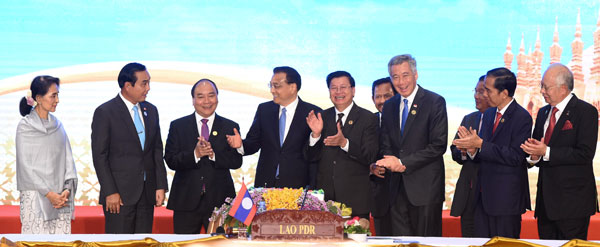Progress in China-ASEAN ties hailed
By Hu Yongqi in Vientiane and Wang Qingyun in Beijing (China Daily) Updated: 2016-09-08 01:36Leaders agree on guidelines for hotline,statement on code for encounters at sea
 |
|
Chinese Premier Li Keqiang (from left, 4th) and leaders from ASEAN members attend the 19th ASEAN-China Summit in Vientiane, Laos, Sept 7, 2016. [Photo/Xinhua] |
China and Southeast Asian countries have agreed to guidelines for a senior diplomats' hotline to address maritime emergencies and issued a statement on applying the Code for Unplanned Encounters at Sea in the South China Sea.
The documents were important progress by China and ASEAN over the South China Sea issue, said observers.
The joint statement on the application of the Code for Unplanned Encounters at Sea in the South China Sea, and the guidelines for hotline communications among senior diplomatic officials between the two sides, were released by China and members of the Association of Southeast Asian Nations after Premier Li Keqiang attended the 19th ASEAN-China Leaders Meeting.
The meeting was held on Wednesday in Vientiane, the capital of Laos.
Li said he believed the documents will be of great significance in boosting mutual trust, reducing maritime risks and safeguarding peace and stability in the South China Sea.
The joint statement reaffirmed all parties' commitment to improving the operational safety of naval ships and aircraft and ensuring mutual trust among all parties, while upholding the China-ASEAN commitment to the 2002 Declaration on the Conduct of Parties in the South China Sea.
The final approval comes one month after the 13th senior officials' meeting on the implementation of the Declaration on the Conduct of Parties in the South China Sea, which was held in the Inner Mongolia autonomous region.
At that meeting, senior diplomats from China and the ASEAN countries approved a guideline for a hotline to use during maritime emergencies as well as a joint declaration that the Conduct for Unplanned Encounters at Sea, signed in 2014 by more than 20 Pacific nations, applies to the South China Sea.
Vice-Foreign Minister Liu Zhenmin told a news conference after the meeting that documents about the hotline and the conduct for unplanned encounters would be presented to the ASEAN-China Leaders Meeting for final approval.
"China and the ASEAN countries have the desire to cooperate, which is most important. Mutual trust is still being strengthened after the South China Sea issue and other issues, which is good news," said Zhou Fangye, a researcher of Southeast Asian studies at the Chinese Academy of Social Sciences.
Ruan Zongze, executive vice-president of the China Institute of International Studies, said the agreement made on Wednesday is a step forward by China and its Southeast Asian neighbors on cooperation and mutual trust.
Premier Li arrived in Vientiane on Tuesday to start his four-day trip to Laos, which is the ASEAN chair this year and hosts all ASEAN and East Asian summits.
Li also vowed to enhance practical cooperation with ASEAN countries while meeting with the leaders of the 10 ASEAN members, including Laotian Prime Minister Thongloun Sisoulith and Singaporean Prime Minister Lee Hsien Loong.
Before the meeting, Thongloun and Lee joined Li and other leaders to slice a cake in a ceremony to mark the 25th anniversary of China-ASEAN dialogue relations.
Since 1991, China has promoted bilateral relations and strengthened regional peace, stability and prosperity while sticking to win-win cooperation based on mutual respect, understanding, trust and support, Li said.
Contact the writers at huyongqi@chinadaily.com.cn




